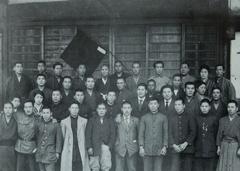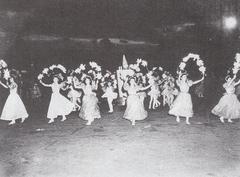
Okihamamachi Fukuoka Visiting Hours, Tickets, and Historical Sites Guide
Date: 04/07/2025
Introduction to Okihamamachi, Fukuoka: History and Significance
Located on the vibrant northern coast of Kyushu within Fukuoka City, Okihamamachi is a district where the echoes of centuries-old heritage blend seamlessly with modern urban energy. This area offers an immersive experience of Japanese culture, featuring traditional shrines, lively festivals, and bustling markets. For travelers interested in Fukuoka’s historical tapestry, Okihamamachi is a must-visit, with highlights such as traditional machiya townhouses and close proximity to the iconic Fukuoka Castle ruins. The district is also alive with festivals like the UNESCO-listed Hakata Gion Yamakasa, a symbol of local spirit and tradition.
From sampling Hakata ramen at local yatai stalls to participating in workshops on Hakata-ori textiles and ningyo dolls, or simply wandering stone-paved alleys resonant with history, Okihamamachi invites visitors to connect with Fukuoka’s rich cultural fabric. This guide provides everything you need for a rewarding visit: detailed visiting hours, ticketing info, transportation insights, and accommodation options ranging from luxury hotels to boutique guesthouses.
Seasonal highlights abound—from cherry blossom hanami in spring to vibrant summer festivals and autumn foliage—ensuring memorable experiences year-round. For deeper planning, consult reputable sources like Go Fukuoka, PlanetWare, and Visit Inside Japan.
Contents
- Introduction
- Historical Evolution of Okihamamachi
- Cultural Landmarks and Heritage Sites
- Shrines, Temples, and Spiritual Traditions
- Architectural Heritage
- Festivals and Community Events
- Key Festivals
- Traditional Crafts & Arts
- Culinary Traditions and Everyday Life
- Food Culture
- Shopping Arcades & Boutiques
- Transportation & Accessibility
- Visiting Hours, Tickets, and Tours
- Accommodation Options
- Seasonal Highlights
- Practical Visitor Tips
- FAQ
- Conclusion
- Sources
Historical Evolution of Okihamamachi
Okihamamachi’s development is tightly woven with Fukuoka’s broader history as a gateway between Japan and continental Asia, its location on Hakata Bay facilitating centuries of trade and cultural exchange (Go Fukuoka). During the Edo era, the merger of Fukuoka and Hakata boosted the district’s prosperity, especially due to its river and port proximity (PlanetWare). Today, the area retains traces of its mercantile roots in its narrow streets and traditional architecture, standing as a testament to its enduring legacy.
Cultural Landmarks and Heritage Sites
Shrines, Temples, and Spiritual Traditions
Though the landmark Shofukuji Temple is situated in Hakata, its influence permeates Okihamamachi (Visit Inside Japan). Local shrines within Okihamamachi host seasonal festivals, including New Year’s hatsumode and Setsubun, helping preserve ancient customs (Go Fukuoka).
Architectural Heritage
Traditional machiya townhouses and stone-paved alleys evoke the district’s historic charm. While Okihamamachi itself lacks castle remains, the nearby Fukuoka Castle ruins in Maizuru Park provide deep insight into the city’s feudal era (PlanetWare).
Festivals and Community Events
Key Festivals
- Hakata Gion Yamakasa: Taking place every July, this UNESCO-listed festival is a Fukuoka highlight, with Okihamamachi actively participating in the festivities (Visit Inside Japan).
- Neighborhood Matsuri: Throughout the year, local festivals and harvest events offer authentic glimpses into community spirit.
Traditional Crafts & Arts
The area is known for Hakata-ori textiles and Hakata ningyo dolls, with some artisans offering hands-on workshops (Go Fukuoka). The adjacent Hakataza Theater regularly features Noh and Kabuki performances.
Culinary Traditions and Everyday Life
Food Culture
Okihamamachi’s food scene thrives on its markets—like Yanagibashi and Nagahama—and specialties such as Hakata ramen, mentaiko, and seafood (PlanetWare). Local izakaya and street yatai offer an immersive culinary experience.
Shopping Arcades & Boutiques
Family-run shops and trendy boutiques characterize the shotengai arcades, especially lively during festival seasons (Go Fukuoka).
Transportation & Accessibility
Getting There
- By Air: Fukuoka Airport, 2.6km from Hakata Station, offers direct subway access (MyTravelBuzzG).
- By Rail: Hakata Station is the main terminal, with Sanyo Shinkansen and JR Kyushu lines (Japan Travel Navitime).
- By Subway/Bus: Three subway lines connect Okihamamachi to the city; buses are extensive and cost-effective.
- By Taxi: Taxis are readily available; rideshare options are limited.
Local Transport
The area is highly walkable. Bike rentals and open-top sightseeing buses are also popular (Japan Travel Navitime).
Accessibility
Public transport and major attractions are barrier-free, with multilingual signage and accessible facilities throughout (Japan Travel Navitime).
Visiting Hours, Tickets, and Tours
- Kushida Shrine: Open daily 6:00 AM–9:00 PM; free entry (special event tickets may apply).
- Fukuoka Castle Ruins: Dawn–dusk; no ticket required.
- Markets and Shops: Generally 9:00 AM–6:00 PM.
- Museums (e.g., Hakata Machiya Folk Museum): 9:30 AM–5:30 PM; closed Mondays; ~200 yen admission (The Broke Backpacker).
- Guided Tours: Walking and themed tours are available; advance booking is recommended.
- Workshops: Some require reservations; check official sites for details.
Accommodation Options
Where to Stay
- Hakata Station Area: Central, ideal for transport and shopping.
- Tenjin: Commercial heart, with diverse hotels and nightlife.
- Nakasu: Noted for riverside yatai and vibrant atmosphere (Treksplorer).
Types
- Luxury: Hotel Okura Fukuoka, One Fukuoka Hotel (Luxury Hotel Guide).
- Boutique: 9HOTEL Tenjin, TEN APARTMENT HOTEL Hakata Reisen, Hotel Il Palazzo (New Hotels Guide, Unique Hotels).
- Mid-Range: Hotel Clio Court Hakata, Comfort Inn Fukuoka Tenjin (Japan Travel Navitime).
- Budget/Capsule: Numerous affordable options near Hakata and Tenjin.
- Vacation Rentals: Increasingly popular for families and groups.
Booking Tips
- Book early for festivals (May, July).
- Choose hotels near subway stations for convenience.
- Most properties offer barrier-free access and English-speaking staff.
Seasonal Highlights
- Spring (March–May): Cherry blossoms in Ohori and Maizuru Parks (Hey Roseanne).
- Summer (June–August): Hakata Gion Yamakasa, sunflower blooms on Nokonoshima Island, major fireworks (Fun Japan).
- Autumn (September–November): Pleasant weather, foliage, harvest festivals (Wanderful Horizons).
- Winter (December–February): Illuminations, sumo tournaments, New Year’s shrine visits (Japan Talk).
Practical Visitor Tips
- Transport: Use IC cards or unlimited passes for subway/bus (Japan Travel Navitime).
- Language: English signage is common; basic Japanese is appreciated.
- Etiquette: Dress modestly at shrines, be respectful and quiet, follow local customs.
- Safety: The area is safe; standard precautions apply.
- Best Times: Visit in spring or autumn for comfort and events; book ahead for festivals (This Way to Japan).
Frequently Asked Questions (FAQ)
Q: What are the typical visiting hours for Okihamamachi attractions?
A: Most open from 6:00 or 9:00 AM to 6:00 or 9:00 PM; check specific sites.
Q: Are tickets required for shrines and festivals?
A: Entry to shrines is usually free; special viewing for festivals or museum entry may require tickets.
Q: How can I get around Okihamamachi?
A: By subway, bus, on foot, or by bicycle; taxis are also available.
Q: Is the area accessible for wheelchair users?
A: Yes—public transport and most hotels and attractions are barrier-free.
Q: When should I book hotels for festival periods?
A: As early as possible, especially for May and July festivals.
Conclusion
Okihamamachi stands as a vibrant microcosm of Fukuoka’s past and present, where historical depth, cultural richness, and modern amenities coalesce. Whether you’re exploring ancient shrines, immersing yourself in festival energy, savoring local delicacies, or enjoying the ease of accessible transport and diverse accommodation, this district delivers an authentically Japanese experience for every traveler. Plan ahead, utilize reputable resources, and consider guided tours to fully appreciate what Okihamamachi has to offer. For real-time updates and personalized travel assistance, download the Audiala mobile app.
Sources and Further Reading
- Go Fukuoka
- PlanetWare
- Visit Inside Japan
- MyTravelBuzzG
- Japan Travel Navitime
- Japan Switch
- Locals in Japan
- The Broke Backpacker
- Fun Japan
- Hey Roseanne
- Wanderful Horizons
- Japan Talk
- Treksplorer
- Luxury Hotel Guide
- New Hotels Guide
- Unique Hotels
- The Crazy Tourist



























